Putin in Brussels: German cars and Russian gas
Ralitsa Kovacheva, March 2, 2011
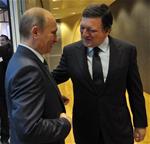 The visit of Russian PM Vladimir Putin in Brussels on 24 February did not leave any doubts that Russia would not allow anything to stop it from protecting its interests on the European gas market. At a joint press conference with the President of the European Commission, Jose Manuel Barroso, Mr Putin once again attacked the Third Energy Package – the EU energy legislation.
The visit of Russian PM Vladimir Putin in Brussels on 24 February did not leave any doubts that Russia would not allow anything to stop it from protecting its interests on the European gas market. At a joint press conference with the President of the European Commission, Jose Manuel Barroso, Mr Putin once again attacked the Third Energy Package – the EU energy legislation.
Our gas via our pipes!
Mr Putin’s problem is with the prohibition the owners of a pipeline to automatically have 100% ownership of its capacity. Instead, they are obliged to keep only a part of the capacity for themselves and to admit third countries to use the pipe. Exactly because of this requirement the South Stream intergovernmental agreement between Bulgaria and Russia has to be amended. Together with Germany, Russia is currently working on the construction of the North Stream gas pipeline and Mr Putin used this particular example to illustrate his case:
“We are being told, “He who has gas must not also have the means to transport it.” Gazprom has laid a pipe on the bottom of the Baltic Sea together with its European partners – German and Dutch. But now it’s being said we should admit a third party there. Where? We produce gas in Russia together and pump it along the pipeline, which is our common property. Where should we admit a third partner? To the pipe? Should that partner drill a hole in the pipe, or what? Where will he take the gas? We are told to sell our gas at the entrance to the European Union, and a third partner will appear – the gas owner. But then, if the third partner purchases gas, he will need to make a profit. So the price will go up.”
Moreover, in the context of the events in North Africa and the rising costs of oil 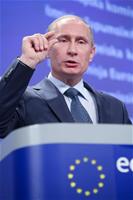 and energy resources Mr Putin openly stated: “Incidentally, in this context, all of our infrastructure projects for delivering hydrocarbons to Europe, to the European market – I have in mind both Nord Stream and South Stream – are becoming particularly topical. If these two projects had already been operational, there would have been much less risk and concern in Europe. I think that the prices would also have been a little lower despite existing problems."
and energy resources Mr Putin openly stated: “Incidentally, in this context, all of our infrastructure projects for delivering hydrocarbons to Europe, to the European market – I have in mind both Nord Stream and South Stream – are becoming particularly topical. If these two projects had already been operational, there would have been much less risk and concern in Europe. I think that the prices would also have been a little lower despite existing problems."
In Brussels Mr Putin announced that a Road Map for energy co-operation by 2050 between Russia and EU was being developed. He did not miss the opportunity to complain about the fact that the German energy regulator had not yet consented to Russian natural gas pumping via the Nord Stream, justifying the delay by referring to the Third Energy Package. In contrast to the ideas of replacing the current system of long-term gas supply contracts with sales on the spot markets, the Russian PM argued that the EU would not benefit from this scheme and pointed out that currently the spot market prices exceeded contract prices, while stable long-term contracts are essentially important for the economies in Europe.
Responding to the criticism, European Commission President Jose Manuel Barroso defended the Third Energy Package underlining that it is not discriminatory as it applies not only to Russian but also Norwegian and any other businesses, including European companies. However, Mr Barroso hinted that other ways could be found to satisfy Russian demands. According to him the Third Package can offer a choice between 3 models but “some members have chosen the thorniest path – division, with production separated from distribution.”
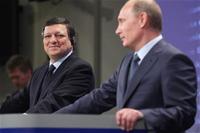 Mr Barroso did not name those countries, nor did he explain the other existing options (the appointment of an independent operator of the pipeline or of a special board to decide about its use). “We understand Russia’s concern, and now the job is to settle the differences and disagreements that troubled our relations,” Mr Barroso said. He, nevertheless, used the opportunity to note: “Our industry runs on Russian natural gas. It heats our homes. But we have to pay for this gas, and we pay a good price. We are reliable customers to Russia".
Mr Barroso did not name those countries, nor did he explain the other existing options (the appointment of an independent operator of the pipeline or of a special board to decide about its use). “We understand Russia’s concern, and now the job is to settle the differences and disagreements that troubled our relations,” Mr Barroso said. He, nevertheless, used the opportunity to note: “Our industry runs on Russian natural gas. It heats our homes. But we have to pay for this gas, and we pay a good price. We are reliable customers to Russia".
The Brussels-based website EurActiv quotes Russia’s energy minister Sergei Shmatko saying that it could be possible, for instance, to yield some exceptions to the transnational gas pipelines that are seen as part of a transnational transport system. “And we could exclude the possibility of third actors interfering in segments on EU territory for their payback period." Sergei Shmatko expressed disappointment that South Stream did not yet enjoy the same status as Nord Stream, which is recognised as part of the Transeuropean Energy Network.
At the same time, however, Brussels and Moscow agreed on “a promotional event” of the South Stream project to be organised by Russia next April in the heart of Europe. European Commissioner Günther Oettinger has promised to participate in the event, even though the European Commission has not committed itself to hosting it. South Stream is seen as a rival to the European project “Nabucco”, but taking into account the slow progress of Nabucco and the strong pressure by Russia it will not be a surprise if ultimately South Stream receives the yearned status of a EU priority project.
Not for the first time
The statements of Mr Putin in Brussels are the latest episode of a prolonged attack on the European energy legislation. During his visit in Sofia on November 13, 2010, the Russian PM warned that EU was facing the risk of falling behind in the development of its energy infrastructure and that the high prices of the energy sources were also a peril if, through the Third Energy Package, Gazprom’s access to European market would be restricted.
But even if we then thought that he took the liberty to say this exactly in 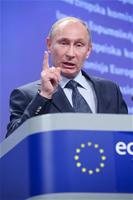 Bulgaria – the country that was once referred to as “a Trojan horse” in EU – only a month later - not elsewhere but in Germany - Mr Putin rhetorically asked German business: “I do not understand what you will use for heating? You don't want gas, you are not developing nuclear energy. Will you use firewood? You should realise that you'll need to get firewood from Siberia. You don't even have firewood in your country.”
Bulgaria – the country that was once referred to as “a Trojan horse” in EU – only a month later - not elsewhere but in Germany - Mr Putin rhetorically asked German business: “I do not understand what you will use for heating? You don't want gas, you are not developing nuclear energy. Will you use firewood? You should realise that you'll need to get firewood from Siberia. You don't even have firewood in your country.”
German Chancellor Angela Merkel then openly supported the Russian demands. Ms Merkel stated that Germany had never shared the philosophy, induced by the European Commission, to divide the ownership of transport infrastructure from the ownership of transported goods. “We are willing to show maximum flexibility as well as to require maximum flexibility, and this is another issue we will raise with Brussels. Since there are fewer suppliers on the gas market than, for example, there are on the electricity market, where there are multiple suppliers, in Germany, for example, they need access to the network. But I do not know of another supplier for the Nord Stream pipeline that could deliver gas through this channel. So I think we have time to find our way.”
The human rights in Russia
On the eve of Mr Putin’s visit in Brussels European media were particularly excited whether the topic of human rights in Russia will be part of the agenda. In his official statement European Commission President Mr Barroso pointed out: ”Strengthening the rule of law and fundamental freedoms is a shared commitment and we expect Russia to respect its international commitments in the field of human rights”. Jose Manuel Barroso thanked Mr Putin for “for the very open (I think around one hour) discussion we had on these matters where PM Putin was expressing to me the positions of Russia on these very sensitive issues.”
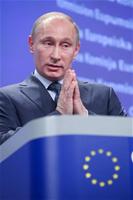 In his turn, commenting on the events in North Africa, Vladimir Putin unambiguously warned the West not to meddle with the internal affairs of other countries: „Yes, it’s true that people should have an opportunity for self-determination and build their futures without any intrusion from the outside. Any society should move along a path towards democratic institutions, self-regulation, and the creation of its own system of government based on its own development".
In his turn, commenting on the events in North Africa, Vladimir Putin unambiguously warned the West not to meddle with the internal affairs of other countries: „Yes, it’s true that people should have an opportunity for self-determination and build their futures without any intrusion from the outside. Any society should move along a path towards democratic institutions, self-regulation, and the creation of its own system of government based on its own development".
The Brussels-based online edition EUobserver points out that the journalists were allowed to ask just four questions – two for each side – and that not even one of the questions was related to the topic of human rights. According to a European Commission official, who selected the reporters on behalf of the EU, neither he nor Mr Putin’s spokesperson requested to know the questions in advance. Mr Putin’s spokesperson even specified that his boss does not mind questions on human rights – on the contrary, he loves them.
Celebrity buzz
EUobserver reports that as “a former spy chief and a sex symbol in some Russian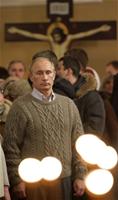 households” Vladimir Putin caused a celebrity buzz in the European institutions. Against the explicit instructions that only reporters should be present in the press conference room, many Commission officials sneaked there anyway only to catch a look of the high guest. Because of the draconian security measures the journalists sitting at the first row joked what would happen if someone threw a shoe at Mr Putin. Again because of the security measures, the Ministers of the Interior of the EU had to postpone their press conference on Libya.
households” Vladimir Putin caused a celebrity buzz in the European institutions. Against the explicit instructions that only reporters should be present in the press conference room, many Commission officials sneaked there anyway only to catch a look of the high guest. Because of the draconian security measures the journalists sitting at the first row joked what would happen if someone threw a shoe at Mr Putin. Again because of the security measures, the Ministers of the Interior of the EU had to postpone their press conference on Libya.
The huge Russian delegation hired 30 limousines from the European Commission’s fleet, specifying that they only wanted German brands such as Mercedes, Audi and - for junior officials - Volkswagen.